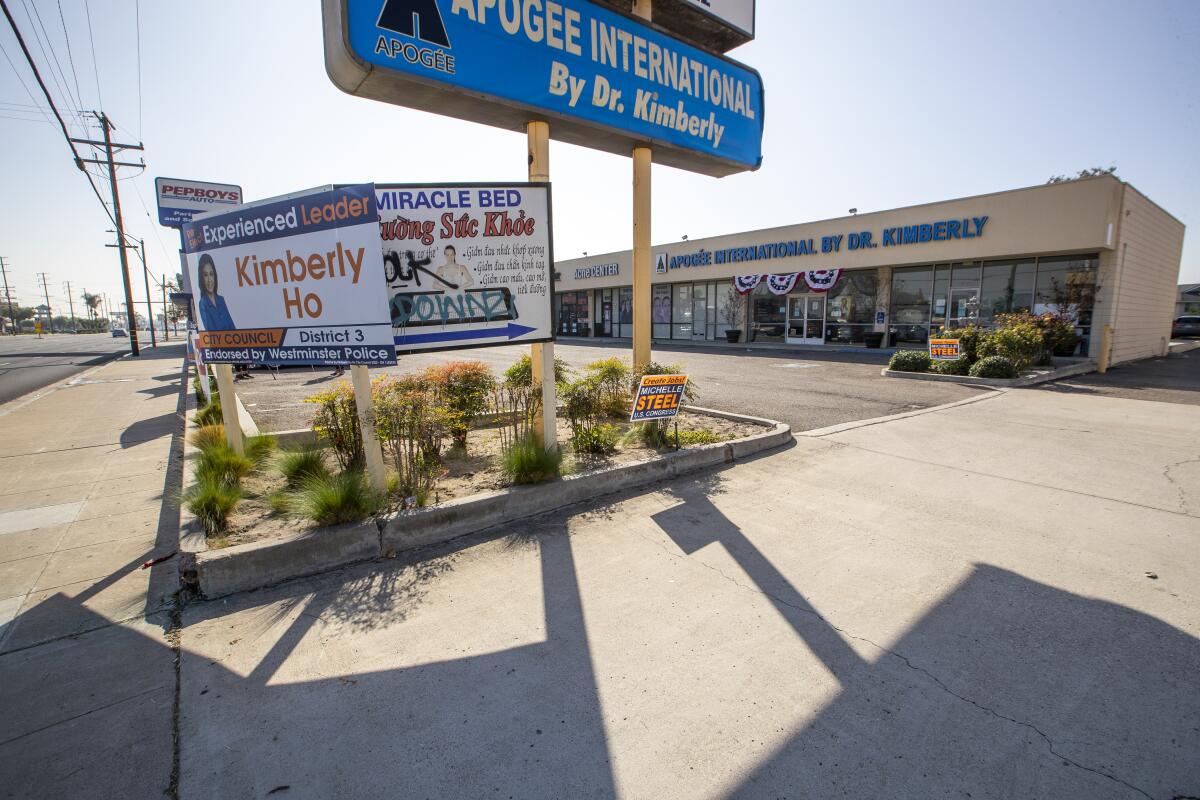A ‘polling place’ at Republican’s office in Orange County: A new front for election high jinks?

- Share via
Even with the constant drumbeat of news about election high jinks in 2020, allegations of a fake voting center in Orange County stood out as something brazen.
The center was advertised on Vietnamese language radio and television as an election assistance site, a “secure” location where non-English speakers could guarantee their absentee ballots weren’t “fraudulent.” Another sign that was posted outside the office said “ballot room” or “polling place” in Vietnamese.
In reality, it was the campaign office for Republican Westminster Councilwoman Kimberly Ho.
Two months after the election, a number of questions about the site remain unanswered, including whether the campaign misled voters by promoting the office as a place to drop off ballots and receive other election-related services. Critics also raised possible repercussions: Will other campaigns see value in such voting assistance, muddying the distinction from official polling places?
Ho’s campaign has denied any wrongdoing. A statement released by her campaign in November said an ad was sponsored by campaign supporters “informing voters, in their native language, to contact our campaign office with any questions or issues related to the election. The ad was straightforward, pure and simple.”
However, Justin Levitt, a professor at Loyola Law School and an expert on California election law, said that from what he’s seen in media reports, the office was represented in signage and advertisements in a way that could be deceptive to voters.
“It’s hard to think at least some voters weren’t confused about what they were encountering,” Levitt said.
An investigation by the Orange County district attorney’s office remains ongoing, a spokeswoman said late last month. So far, they’ve determined that discarded election materials included only envelopes, not ballots, but would not comment further.
The inquiry will likely rest on a number of factors, including whether the staff filled out ballots for voters, whether the free sticky rice, sweets and tea offered at the center were provided in exchange for votes for particular candidates, and whether communications about the center were intended to deceive voters, Levitt said.
Even if there was no wrongdoing, critics contend that current laws fail to protect voters from deceptive practices and have called for changes to disclosure rules for political ads.
Congressman Lou Correa (D-Santa Ana) said he fears Ho’s voting assistance center was just the beginning, and that other candidates will set up similar offices in future elections.
“Given how important democracy is, given how cherished democracy is, at the end of the day voting centers like Kimberly Ho’s should not be permitted under the law,” Correa said.
Word about the Westminster voting site gained attention as President Trump has continued to claim, almost entirely without evidence, widespread voting irregularities in key states in the 2020 presidential election.
California officials reported few problems.
In Hawthorne, two men, one who was bidding to become mayor, were charged with voter fraud after allegedly trying to register 8,000 “fictitious, nonexistent or deceased” voters to receive mail-in ballots, according to a criminal complaint. L.A. County’s top elections official said uncovering the scheme demonstrated how unlikely it would be to miss similar red flags had millions of fraudulent votes been cast across the country, as Trump and some of his supporters have alleged.
Meanwhile, Republican party officials raised eyebrows when they placed ballot drop-off boxes around the state and falsely labeled some of them as “official,” prompting outrage among Democrats and a cease-and-desist letter from state elections officials. The boxes appeared outside churches, party offices and private businesses. GOP officials insisted they followed state election laws and a judge ruled that information about the boxes did not have to be turned over to the state.
Then on election day, a local activist posted video that appeared to show workers outside Ho’s campaign office discarding opened ballot envelopes, and a cardboard sign with the handwritten words “vote here.”
Orange County Registrar of Voters Neal Kelley told The Times previously that he asked Ho’s campaign to remove the signs because he feared they could mislead some voters into thinking the office was an official polling site.
Ho’s campaign claimed that the “vote here” sign in English was posted by others looking to falsely accuse the office of being a fake voting center.
It’s unclear how many people visited the office.
The advertisements referred to the location as a “campaign” or “election office.” But the language was vague and could have easily been interpreted by a layperson as a voting assistance center unaffiliated with any political campaign, said Natalie Tran, a Vietnamese language expert and director of the National Resource Center for Asian Languages at Cal State Fullerton.
“I wouldn’t think it’s a campaign office. I would think it was a community center where I could go to get resources,” Tran said.
Ads were broadcast on radio and television stations that are a vital source of information for Orange County’s Little Saigon, an area that includes a business district and the largest community of Vietnamese expatriates in the world.
The ads were entirely in Vietnamese — except for the legally required disclosure that they were paid for by political campaigns. Those disclosures were in English, which might not provide non-English speakers adequate notice, Tran said.
“If the law is written to protect consumers then I think the law needs to be attentive to protecting consumers who speak another language other than English,” Tran said.
Still, Tran said she saw some need to serve members of the Vietnamese immigrant community who might be reluctant to seek assistance at official polling places because of language and cultural barriers. Official polling places also offered voting assistance in Vietnamese.
Westminster Councilman Tai Do, who lost a race in a newly created council district against Ho in November, said there was “an intent to deceive” voters with the ads. Do remains a councilman in his at-large seat for at least the next two years.
“There’s a lot of manipulation of the Vietnamese media by these elected officials,” Do said.
Local politicians involved with the ad campaign have largely remained quiet about the matter.
Westminster Mayor Tri Ta and former Republican Assemblyman Tyler Diep, who both sponsored ads with political campaign funds and could be heard narrating them, did not return calls from The Times for comment.
On election day, however, Diep denied that a television ad he sponsored was misleading, saying that the words “Văn Phòng Tranh Cử” referred to a “campaign office.” He described the ad as a “public service announcement.”
“The official polling places have opened. Together let’s go vote to express our voice,” the ad said, according to a translation by The Times. It also gave the address of the strip mall where the office was located.
“There’s no county logo inside. I think people who would make that mean-spirited allegation are not the same people who would help voters. This PSA does not encourage, cajole or compel anyone to vote for any party or any candidate,” Diep said.
Van Tran, a Ho campaign attorney and former Republican state assemblyman, declined to answer questions about what occurred inside the office. He said everything was done “within the confines of the law.”
Tran said that efforts to criticize and single out Ho’s office would chill voter participation among Vietnamese immigrants and hamper community activists in their ongoing work to register and educate more immigrant voters.
Some voters said they appreciated the services at the center and called it an important resource for the immigrant community.
Bao Pham, a manicurist from Garden Grove, brought his completed ballot to the campaign office after a friend told him about its “advertised services.”
“They did not ask me any questions about how I voted or who I voted for,” he said of staff members who greeted him. He said an employee offered to help deliver his ballot to the county. “People do help us and it’s good that they’re here to assist us. This is an important election and we need places like this.”
Vickie Nguyen, a payroll administrator at an aerospace company, didn’t visit the vote center but after seeing media accounts said it appeared to her to be “very shady.”
Nguyen, 25, said she voted for Democratic congressional candidate Harley Rouda and noted that videos showed people at the center wearing T-shirts promoting his opponent, Michelle Steel. Steel won the election by more than 8,000 votes.
Steel‘s campaign has denied any involvement with the office.
Nguyen said hearing about the center led her to question the integrity of the local election.
More to Read
Sign up for Essential California
The most important California stories and recommendations in your inbox every morning.
You may occasionally receive promotional content from the Los Angeles Times.
















